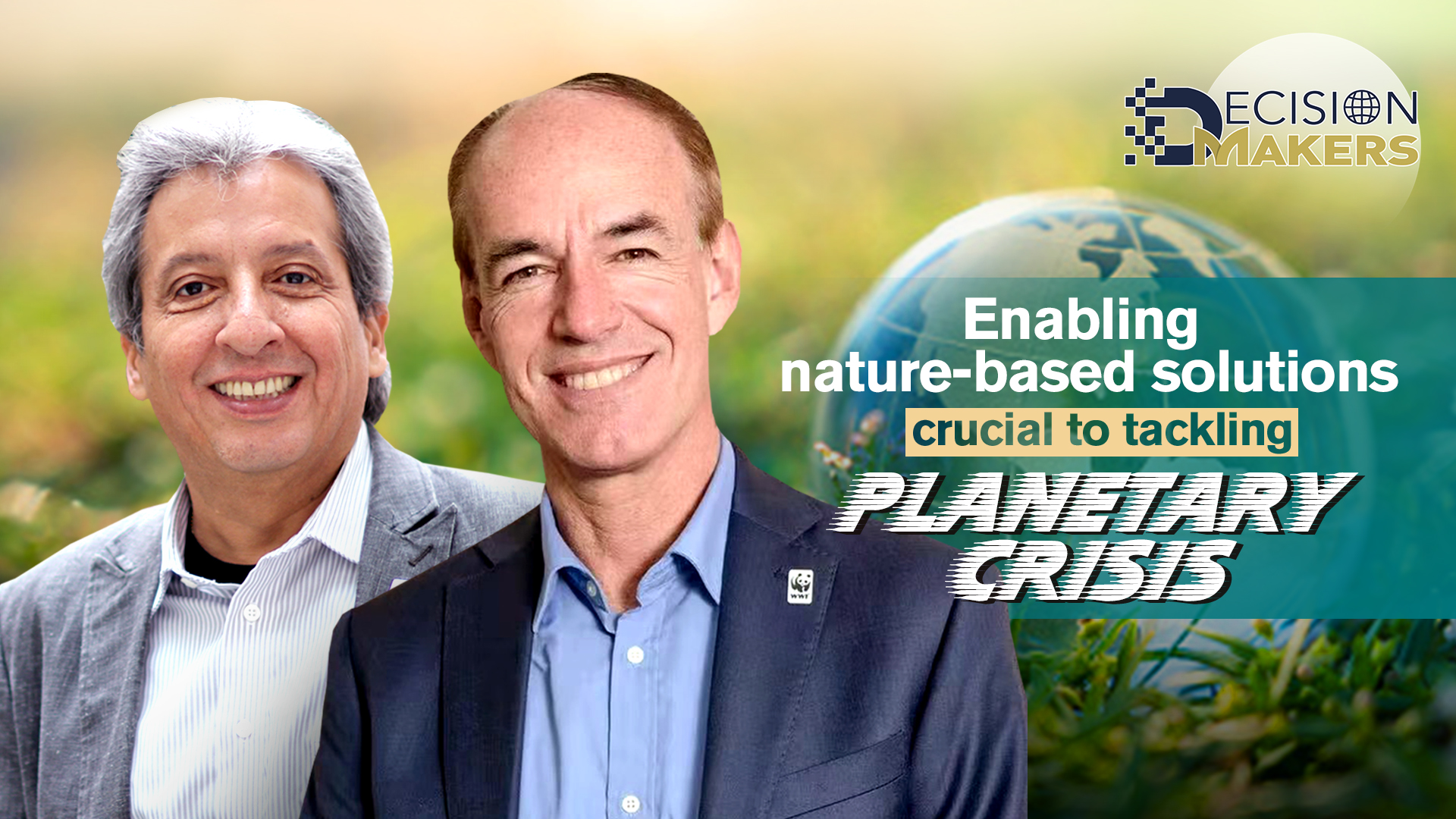
Editor's note: Decision Makers is a global platform for decision makers to share their insights on events shaping today's world. Marco Lambertini is Director General of WWF International. Manuel Pulgar-Vidal is WWF's Global Leader of Climate and Energy and Chair of its Nature-based Solutions Steering Committee. The article reflects the authors' opinions and not necessarily the views of CGTN.
Humanity's current development model based on burning fossil fuels and converting natural ecosystems for agriculture is changing the climate, degrading once-productive lands and driving plant and animal species to extinction. It's no coincidence that millions of people are affected each year by the direct consequences of poverty, lack of clean water or adequate nutrition, extreme weather, and exposure to new virulent pests and diseases.
Centuries of over-exploitation has perpetuated a sense that humanity is somehow distant and disconnected from nature. In reality, we are deeply dependent on nature's health to safeguard our own. We now have more and better knowledge of how to work with nature's potential through an aligned understanding, effective undertaking and scaled implementation of an extremely powerful concept: nature-based solutions.
Our new "Powering Nature" report interrogates the most prevalent issues blocking our collective ability to unlock nature's potential and proposes ways in which nature-based solutions can have a profound impact on our future.
1. Transforming food systems
Taking a nature-positive approach to transforming food systems catalyzes the shift to more sustainable and productive lands. Rehabilitating degraded agricultural land and sustainably managing existing productive lands generates higher crop yields, better nutritional quality and greater food security at local and global levels.
2. Ecological connectivity
Ecological connectivity is crucial to ensure resilient landscapes that can deliver benefits for people and nature, yet this connectivity is being rapidly eroded as natural habitats are fragmented by agriculture, infrastructure, extractives and other uses. Nature-based solutions are the ideal approach to counter this and the benefits of nature-based solutions can be magnified if they are deployed.
3. Flood risk reduction
We need to restore floodplain ecosystems. In river systems worldwide, floodplains are being reconnected and allowed to flood, rather than relying solely on engineered structures such as dams, dikes and floodwalls. Biodiversity is enhanced through the restoration of floodplain ecosystems, which are among the most productive in the world.
4. An ocean of opportunity
Around the world, low-lying small islands and coastal areas are demonstrating the value of protecting "green infrastructure" for increasing resilience to flooding and coastal erosion. Halting and reversing the decline of coastal habitats offers an opportunity for the large-scale application of nature-based solutions.
5. Climate-smart
A smart approach to nature-based solutions builds in resilience to different possible futures in a changing climate. In practice, that means asking questions like "will the benefits of protecting these mangroves disappear with rising seas? Does planting regenerative crops in one place make sense if the soil becomes drier, wetter or saltier with time?"

6. A whole-of-society approach
A whole-of-society, integrated, rights-based and sustainable access approach where individual, collective and nature's rights are integrated, ensuring in particular that Indigenous peoples and local communities, who directly interface with nature and directly depend on nature's resources actively participate in decision-making processes, receive appropriate recognition, including rights and benefits, for their contributions to conserving and restoring ecosystems.
7. Financing
A significant shift in the mindset of public and private investors is vital. Alongside new financial mechanisms and incentives, this will involve redirection of financial flows away from activities that damage nature, to a better understanding of the value and benefits of nature-based solutions with new ways to mobilize private capital towards nature-positive practices, including through the elimination and repurposing of harmful agricultural subsidies.
8. Measuring impact
Nature-based solutions have emerged as a way to make a healthier and more equitable world too by repairing biodiversity. For instance, protecting natural habitats can prevent new outbreaks of disease, and at the same time allow nature to do what it does best - provide clean air, clean water, spaces for physical activity, stress reduction and social cohesion. We need all of this for a healthy society.
9. Aligning policies
Biodiversity loss and climate change are two crises that mutually reinforce each other. Neither will be successfully resolved unless both are tackled together. The IUCN World Conservation Congress is an important opportunity for the conservation community for increased nature-positive ambition. This includes a clear call for a nature-positive mission, supporting a global goal for nature, a footprint milestone and ambitious targets that can be reflected both in the UN Convention on Biological Diversity and in the UN Framework Convention on Climate Change.
10. What needs to happen next?
The delivery of nature-based solutions must be part of a triple-challenge approach that aims to build climate and disaster resilience, ensures environmental sustainability and secures food and livelihoods for communities. Fundamentally, this speaks to a societal reset which transforms social and economic policy through three key enablers: inclusive governance, smart spatial planning, and progressive economic and financial regulation.
Today at the IUCN World Conservation Congress, more than 100 organizations from across the globe issued a joint call for governments to strengthen a draft global biodiversity agreement - our greatest chance to embrace a clear and transformative plan for nature, of which nature-based solutions must be a key part.
Fearful times and worries about the future can, if we choose, turn into the most powerful and exciting agents of change, catalyzing action and transformation. Now is our time and biggest opportunity to course correct towards a safer and better future for all.
(If you want to contribute and have specific expertise, please contact us at opinions@cgtn.com.)

